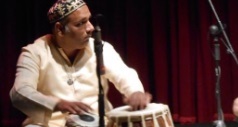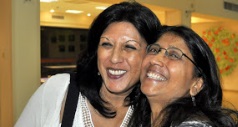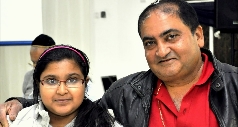KADAVUMBAGAM SYNAGOGUE ("17"th and "18"th centuries, but altered over the years)
Market Road (look for “Cochin Blossoms” fish and plant store near intersection with Jews Street)
Ernakulam
Kochi
Kerala, INDIA
This synagogue is now closed, but the building is under the custodianship of native Jew Mr. Elias (Babu) Joseph. Babu runs his business from the front areas of the synagogue, and he is often there during long working hours to receive visitors and gladly show them around. This includes the mostly-intact sanctuary to the building’s rear. Babu does not tend to use email, but his contact number is "9446444257". For additional information and assistance about this former synagogue, review cochinsyn.com and contact the author of this site, Jay A. Waronker at This email address is being protected from spambots. You need JavaScript enabled to view it..">This email address is being protected from spambots. You need JavaScript enabled to view it..
Jews have lived in Ernakulam, the mainland of Kochi (formerly Cochin) for centuries, many of them small merchants who ran businesses in the crowded market area. These shop owners along with other resident Jews maintained synagogues and a religious school. Today this former synagogue and another around the corner on Jews Street (mid-block towards Broadway on the right side) stand as proud testament to this region of India’s Jewish heritage and atmosphere of diversity and tolerance.
Although hits history cannot be verified, some claim that the original Kadavumbagam Synagogue was constructed in the early 13th century in Cranganore, a Jewish settlement in Kerala to the north. Persecuted by the Moors and Portuguese who had come to that part of India, the Jews shifted to Ernakulam, they were afforded some protection under the tolerant Rajah of Cochin. In time they built a synagogue here. The current building, rebuilt and modified over the years, dates to the early 18th and early 19th centuries.
During the "1950"s and "60"s, many of the Kadavumbagam Synagogue members left for Israel, and the congregation became considerably smaller. By "1972", the synagogue had closed, and within two years the Torah scrolls had been transported to Moshav Nevatim in Israel, an agricultural community which now hosts the Cochin Jewish Heritage Center. In "1975", a storm caused serious damage to the synagogue. The roof and walls were compromised, and the structure had to be hydraulically lifted. Making matters worse, in "1977" thieves broke into the building and stole some of its contents.
In '1979", the small remaining community acted, and guardianship of the building passed to Elias (Babu) Elias, a standing member. For the next six years the synagogue sat vacant. In "1985", Mr. Josephai founded a plant and fish store in the front area of the building. The former synagogue has since been known as "Cochin Blossoms.”
The Kadavumbagam Synagogue, set back from Market Road (the original gatehouse of an unknown design now gone), is approached today along a long and narrow passage lined with plants. The front room with its chamfered corners is unusual for a Kerala synagogue. Downstairs, that space was used as a social hall and for overflow seating during the High Holidays. Upstairs, this area served as a Jewish school. Today it is a storage and office area.
Behind the front rooms is the azara, an anteroom that gets its name from the exterior courtyard of the ancient Jewish temple in Jerusalem (destroyed by the Romans in "70" CE. The azara leads to the sanctuary with its central tebah (bimah) that now missing except for its base , painted locally grown and crafted teak heckal (ark) for storing the Torah scrolls, lotus-patterned ceiling (a unique Indian motif), unique gallery-level second tebah (bowed in shape) from which Shabbat and holiday services were conducted, and women’s seating area behind the mechitzah, or wooden screen wall. Hanging from the decorated ceiling of the sanctuary are an assortment of glass, crystal, and metal lighting fixtures and fans. These are common to all Indian synagogues.
The synagogue’s façade is notable for its two angled walls, rust-colored quoins with stylized capitals and bases, and bold trim. The walls are whitewashed chunam (polished lime with sand) veneer over laterite (a locally-available soft red stone) bricks, and the roof with its deep overhangs (in response to the annual monsoons) is an exposed wooden structure covered with clay tiles. The upper area of the roof includes some exposed wooden details and flourishes typical to this part of Kerala.
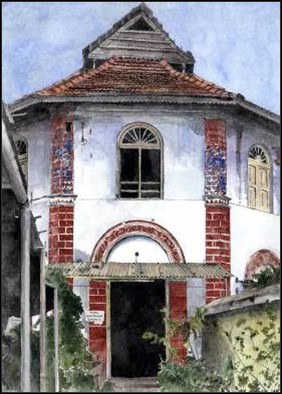
Exterior
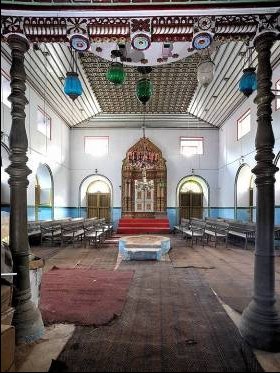
Interior

